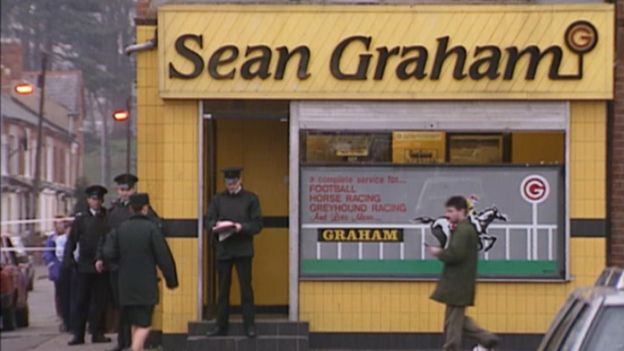 THE PSNI has been accused of a “cover-up” after it failed to reveal “significant information” about a UFF gun attack that left five people dead.
THE PSNI has been accused of a “cover-up” after it failed to reveal “significant information” about a UFF gun attack that left five people dead.
The attack was carried out by the UDA’s military wing on Sean Graham’s bookies at the Ormeau Road in south Belfast in February 1992.
Belfast Daily can reveal that one of the UFF gunman who raked the shop with automatic gunfire was working as an RUC Special Branch informant at the time.
Stephen ‘Inch’ McFerran, now aged 53, was the UFF’s ‘military commander’ on the Ormeau Road.
In 2007, he pleaded guilty to the manslaughter of Roy Green four years earlier and received a five year sentence.
Green was a close ally of exiled former UFF chief Johnny Adair.
‘Inch’ McFerran was linked to around 20 murders in the south Belfast area between 1990 and 2003.
The Police Ombudsman has opened new inquiry lines after finding out about more material linked to the attack.
The PSNI said it never sought to deliberately withhold the information.
It said that the problem had arisen due to issues including human error, “the sheer volume of the material involved and the limitations of the archaic IT systems”.
The families of the victims have previously said they believe there was collusion between the killers and security forces in the betting shop shootings.
Tommy Duffin, whose father Jack Duffin was shot dead in the atrocity at the Ormeau Road betting shop, said the PSNI’s initial failure to disclose all of the information was unacceptable.
“It’s just been cover-up after cover-up after cover-up of RUC-Special Branch collusion in my opinion – plain and utter collusion,” he told the BBC.
“We know it went on and we know it went on through the Troubles and they’re experts at it.
“They’re still getting away with it to this day.”
No-one has been convicted over the killings.
Police Ombudsman Dr Michael Maguire said his staff became aware that police were preparing to disclose material as part of impending civil proceedings.
His office then asked for that material and it helped his staff to “identify significant evidence relevant to a number of our investigations”, he added.
“Police have now also identified a computer system, which they say had not been properly searched when responding to previous requests for information,” said Dr Maguire.
“It would seem information which police told us did not exist has now been found.”
The material has led the Police Ombudsman to examine new lines of inquiry into the Ormeau shootings, events connected to loyalist paramilitaries in the north west of Northern Ireland between 1988 and 1994 and the murder of teenager Damien Walsh at a coal depot in west Belfast in 1993.
Police Ombudsman reports into those investigations have now been delayed.
Dr Maguire said that “in the interests of public confidence in policing” he has asked Stormont’s Department of Justice to commission an independent review into the methods police use to disclose information.
The Committee on the Administration of Justice (CAJ) said the development showed that “the practice (of withholding information and delaying disclosure) is still continuing”.
“[It] is deeply shocking and the claim that it is due to human error simply insults our intelligence,” it added.
“The Police Ombudsman’s office relies on the PSNI acting in good faith to assist it in its investigations as RUC archive material remains within its control.”
“These developments clearly expose the lack of willingness or capacity of the PSNI to provide full disclosure to the Police Ombudsman to allow him to carry out independent and effective investigations.”
The PSNI’s Deputy Chief Constable Stephen Martin apologised to the families of the attack victims.
“We deeply regret that the researchers responding to the Police Ombudsman for Northern Ireland’s (PONI) request were unable to find and disclose it,” he said.
The “error became apparent”, he said, when a researcher working elsewhere in the PSNI “found the material while preparing for disclosure in response to civil litigation”.
He said that there was a number of reasons why one researcher found the material while others did not, including “differing levels of experience and knowledge of our researchers”.
Mr Martin said that the PSNI’s chief constable has concluded that the best interim solution for public confidence in policing would be to give “appropriately vetted” Police Ombudsman staff “full and unfettered access” to its legacy systems.
He also said the PSNI hoped to make substantial changes to its procedures for disclosing information in the coming months and it welcomed any independent review of its system.
A spokesperson for Relatives for Justice claimed there was a “systemic problem in terms of disclosure concerning state killings and in particular killings where collusion is a feature”.
Policing Board chair Anne Connolly said it was “essential” that there was “full disclosure of material to allow the Police Ombudsman’s Office to do its job”.
She added that the PSNI’s search systems and checking processed were “not meeting legislative duties around disclosure and therefore require review”.



